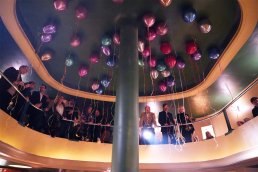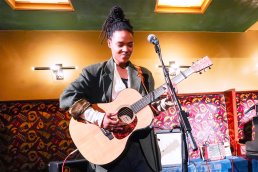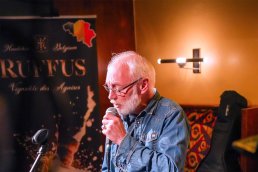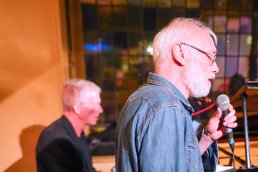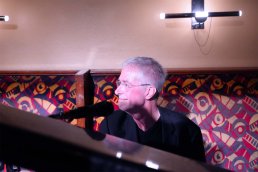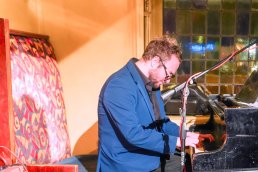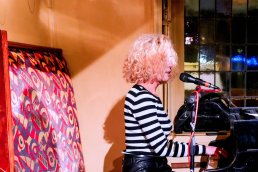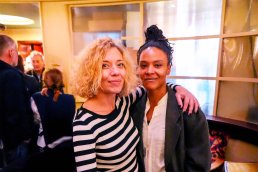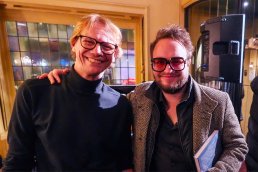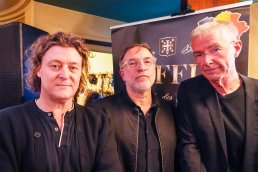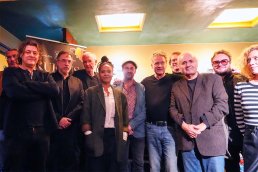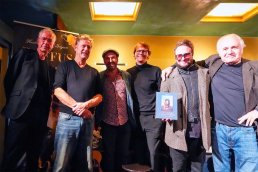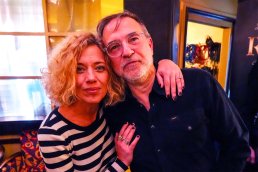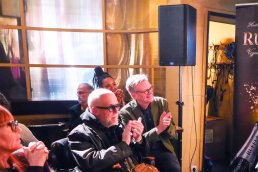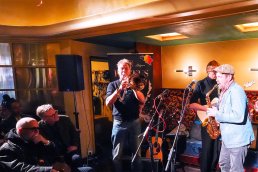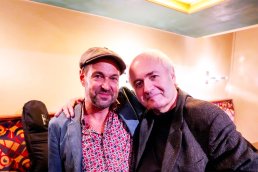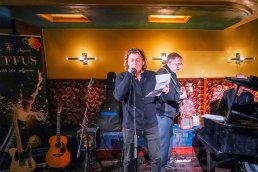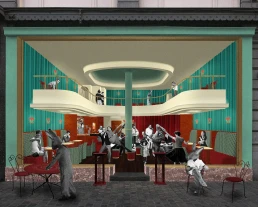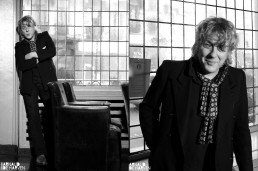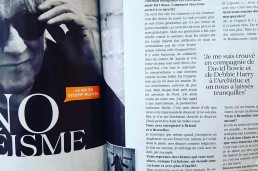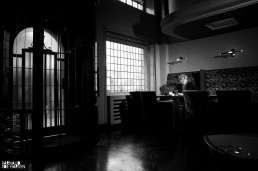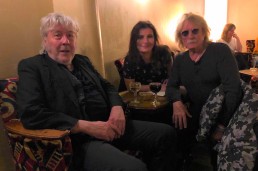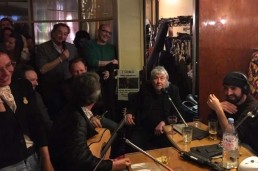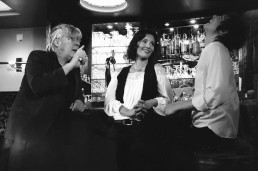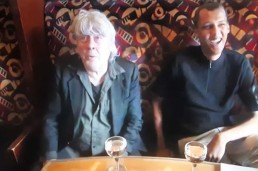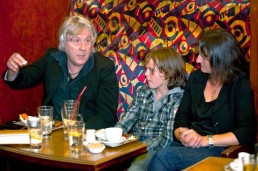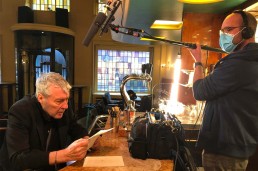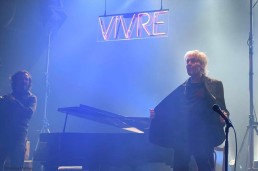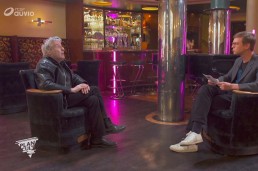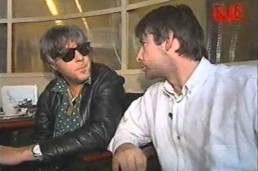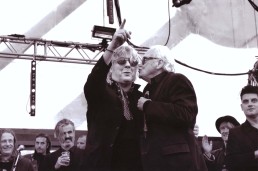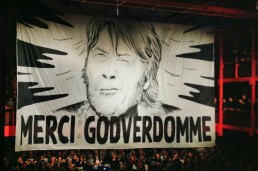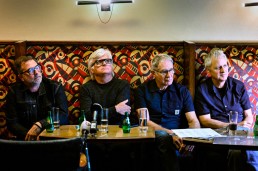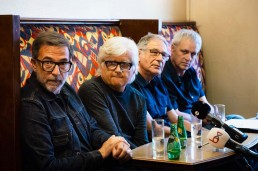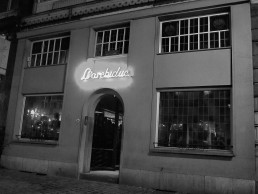Exceptional evening at L’Archiduc on 27 November 2025
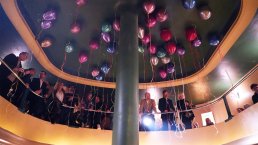
Tribute
Celebrating the 40th anniversary of this magical venue being taken over by Jean-Louis and Nathalie Hennart and the release of the book L’ARCHIDUC FOREVER by Johan Ral.
Artists:
Michael Blass (solo piano)
Igor Gehenot (solo piano)
Patrick Riguelle with Jan Hautekiet on piano
Sarah Carlier
Marie Warnant
Duo: Sarah Carlier & Marie Warnant
Tribute to Arno: Pieter-Jan De Smet (vocals), Mirko Banovic (bass), Jan Hautekiet (piano)
Alpacas Collective
Photography by Bureau Image – Anne Sevellec
L'Archiduc Forever by Johan Ral - The Book is out!
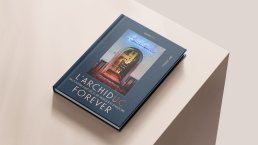
Tribute
In L’Archiduc Forever, music journalist Johan Ral retraces the full, fascinating and intriguing story of the legendary art deco jazz bar in Brussels’ rue Antoine Dansaert.
A story that goes back to 1925 and holds many dimensions: from world history and architecture to graphic arts, literature and music, lots of music.
Starring: the guardians of L’Archiduc’s DNA – Stan and Jacqueline Brenders, Jean-Louis and Nathalie Hennart – a ninety-year-old piano, Jools Holland, Nat King Cole, Mal Waldron, Toots Thielemans, Luc Tuymans, Anna Domino, Marc Moulin, Arno – and the many musicians and artists who have filled this enchanting place with their talent.
L’Archiduc Forever is an exciting story, full of powerful anecdotes, based on countless archive finds and exclusive testimonies, richly illustrated with often unique documents.
The book is available in Dutch and French.
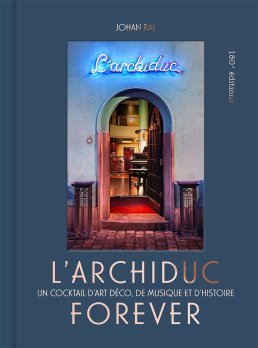
FR
Dans L’Archiduc Forever, Johan Ral, journaliste musical, raconte pour la première fois toute l’aventure, fascinante et intrigante, du mythique bar de jazz Art déco de la rue Dansaert à Bruxelles.
Une aventure qui commence en 1925, avec de nombreuses ramifications : de l’Histoire internationale et l’architecture aux arts graphiques, la littérature et la musique, beaucoup de musique.
Avec, dans les rôles principaux : les gardiens de l’esprit de L’Archiduc – Stan et Jacqueline Brenders, JeanLouis et Nathalie Hennart –, un piano vieux de 90 ans, Nat King Cole, Mal Waldron, Toots Thielemans, Luc Tuymans, Anna Domino, Marc Moulin, Marc Danval, les nombreux musiciens et artistes qui ont peuplé cet endroit enchanteur de leur talent, et Arno, bien sûr.
L’Archiduc Forever offre un récit passionnant, riche en anecdotes captivantes, s’appuyant sur d’innombrables archives et des témoignages exclusifs, abondamment illustré de documents souvent uniques.
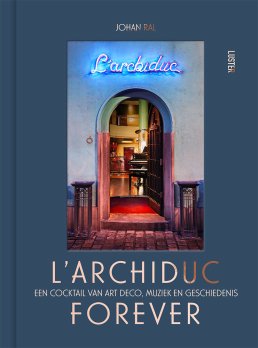
NL
In L’Archiduc Forever vertelt muziekjournalist Johan Ral voor het eerst het hele, fascinerende en intrigerende verhaal van de legendarische art deco-jazzbar in de Brusselse Dansaertstraat.
Een verhaal dat teruggaat tot de jaren twintig, met veel vertakkingen: van wereldgeschiedenis en architectuur tot grafische kunst, literatuur en muziek, veel muziek.
Met in de hoofdrollen: de hoeders van het DNA van L’Archiduc – Stan en Jacqueline Brenders, Jean-Louis en Nathalie Hennart – een negentig jaar oude piano, Nat King Cole, Mal Waldron, Toots Thielemans, Luc Tuymans, Johan Verminnen, Anna Domino, Marc Moulin en de vele muzikanten en kunstenaars die deze betoverende plek met hun talent hebben bevolkt.
En Arno, natuurlijk.
L’Archiduc Forever is een spannend verhaal geworden, vol sterke anekdotes, verteld aan de hand van talloze archiefvondsten en exclusieve getuigenissen, rijkelijk geïllustreerd met vaak unieke documenten.
Posters, Music, and Memories : Michaël Blass, Gino Latucca and Alec Debusschère
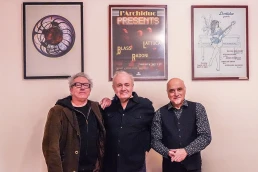
Tribute
A Moment of Jazz History at the Archiduc
Throwback to Sunday, March 4, 2007, at Round About Five, where a memorable concert took place with the late Paolo Radoni.
In this photo, Michaël Blass, Gino Latucca, and Alec Debusschère—one of the artists behind the event poster—stand in front of their work, a tribute to that evening of jazz.
The Archiduc has collaborated with various graphic designers and artists to create posters for these live sessions. Many of them are displayed on the second floor of the Archiduc, showcasing the intersection of jazz and visual art.
Moments like these show the strong connection between music and art, and remind us of the legacy left by the musicians who have played at the Archiduc.
Jazz lives on, and so do the memories.
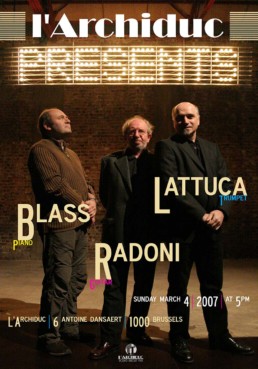
Masterplan project with a David Lynch reference, designed by Popoff Architectes
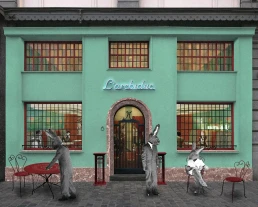
Tribute
The private club L’Archiduc, located near the Bourse of Brussels, was designed in 1943 by architect Franz Van Ruyskensvelde in the « Style 40 » aesthetic. A few years later, it was converted into a private jazz club by conductor Stan Brenders and became the meeting place for prominent jazz musicians, including Toots Thielemans, Nat King Cole, Miles Davis, Vicky Down, Jacques Brel, and many others who were regulars there. In the 1980s, the club was renovated with a more modernist approach compared to its original aesthetic.
This masterplan project, which also includes a material and historical study (commissioned by Popoff Architects from ARCHistory / APEB), aims to restore the venue’s 1943 aesthetic essence while enhancing its scenographic, theatrical, and even cinematic dimension (a reference to David Lynch), reinforcing its mythical status in the Brussels music scene.
The historic furniture, including its iconic banquettes, is being restored. New full-height velvet curtains will adorn the walls, improve the hall’s acoustics, and redefine the stage space. The original wall sconces and their red lampshades will be restored and repositioned in front of the curtains. The finishes of the central column and the mezzanine railings are being redesigned in a contemporary style while remaining true to the spirit of the place.
The masterplan also includes the restoration of the façade on Rue Dansaert, which will retain its well-known 1980s color, familiar to all.
© Popoff Architectes
Arno
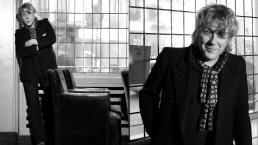
Photography by Arnaud de Harven
Tribute
Arno, the iconic Belgian singer, was a true fixture in Brussels, and his frequent visits to the city’s cafés embodied his deep connection to its vibrant culture. He often found himself at L’Archiduc, where the jazz-filled ambiance seemed to resonate with his own raw, soulful style. Arno’s music captured the spirit of the city—its gritty charm, humor, and resilience. His songs, like his personality, were deeply rooted in Brussels, reflecting the bohemian, eclectic life he led. His presence at local spots wasn’t just a part of his routine; it was part of his creative process, as he drew inspiration from the city and its people.
Arno, sa dernière interview – Les Docus RTBF
Arno – Les yeux de ma mère
Session pour la RTBF à l’Archiduc
Arno & Mélanie De Biasio Interview
Emission « Tout le Baz’art » de Hadja Labiab
Rencontre à l’Archiduc
Arno, born Arnold Charles Ernest Hintjens in 1949 in Ostend, Belgium, was one of Belgium’s most distinctive and beloved musicians. His career spanned several decades, marked by a unique blend of rock, blues, and chanson. Known for his raspy voice and raw, soulful performances, Arno began his musical journey in the 1970s with the band Freckleface, later joining Tjens Couter, which evolved into the new wave band TC Matic. With TC Matic, Arno gained international recognition in the 1980s, blending rock with punk and rhythm and blues, and achieving hits like « Putain Putain, » a song that became an anthem for its unapologetic critique of European society.
After TC Matic disbanded in 1986, Arno embarked on a solo career that would solidify his status as a national icon. Singing in a mix of French, English, and Flemish, he crafted a sound that was both deeply personal and widely accessible, exploring themes of love, loss, and the human condition. Albums like Ratata (1990), À la française (1995), and Le European Cowboy (2002) showcased his ability to blend humor with melancholy, often reflecting on his love-hate relationship with modern society and his nostalgia for the past.
Arno’s career was distinguished by his unique style and fearless authenticity. His stage presence was magnetic, and his concerts were legendary for their intensity and raw emotion. He continued to perform and record music well into his later years, releasing critically acclaimed albums like Human Incognito (2016) and Santeboutique (2019). Even as he faced health challenges, Arno remained committed to his craft, releasing his final album Vivre in 2021. His legacy as a storyteller, an outsider, and an artist who always stayed true to himself has left an indelible mark on Belgian music and continues to inspire audiences around the world.
Link to a few articles:
Dans les yeux d’Arno… Arno se raconte une dernière fois
> Lien RTBF Auvio
Arno, vachement bien ! 20/20 – En une seule phrase d’interview ce serait…
> Lien RTBF Auvio
Hep taxi ! Stromae et Arno à L’Archiduc
> Lien RTBF Auvio
First Opening by Madame Alice

Tribute
1937
Founded by a certain Madame Alice in 1937, the venue was taken over in 1953 by jazz pianist Stan Brenders, who turned it into a temple to jazz. In 1985, it was sold to Nathalie and Jean-Louis Hennart, who made it the starting point for the renaissance of the Dansaert district.
Its interior decoration, in the purest Art Deco style, was designed by architect F. Van Ruyskenvelde. The 1985 renovation was entrusted to Pierre Bourgeois. The dark wood panelling, thick velvet upholstery, elegant chrome fittings and indirect lighting create a cosy atmosphere, particularly pleasing when the blue notes of the grand piano, the focal point of the place, ring out. Sleek banquettes and armchairs welcome guests either on the ground floor or on the mezzanine. Refined beers, wines and cocktails are served from the rosewood bar. L’Archiduc is one of a kind, carrying on the fine tradition of concerts and shows.
